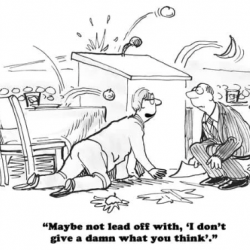Sunday, August 28, 2022

“Judge a man by his questions rather than his answers.”
– Voltaire
What is the purpose of the opening act when you go to a concert, boxing match, or circus? The opening act aims to engage the crowd, heighten the anticipation for the main event, and provide a transition to the main event.
What is your speaker opening act? Specifically, how will you handle the opening of your presentation?
Aren’t you trying to do the same as an opening act in a concert, boxing match, or circus? You are trying to engage your audience, heighten their anticipation for your presentation, and provide a transition to the main event – your presentation.
There are various ways to do this. Below are three I have found helpful in my presentations:
Do the Unexpected
Doing something unexpected is a great way to engage your audience right away. Doing something unexpected immediately causes your audience to think. Thinking audiences are attentive audiences.
You have undoubtedly delivered a presentation when two audience members are talking to each other. A great way to stop their conversation and redirect them to focus on your message is to do something unexpected, like stop talking. The two conversationalists are expecting you to drone on. They are not expecting you to stop talking. I can almost guarantee this will stop their conversation.
Now, what can you do in your opening that is not expected by your audience? Try the following:
Sing a few words of a song relevant to your message
Recite a relevant quote
Tell a relevant story; a personal story, if possible
Doing the unexpected to start your presentation is a great way to focus your audience’s attention on your message.
Another great way to focus your audience’s attention on your message is to ask them a question.
Ask Your Audience a Question
As a speaker, you are asked questions from your audience frequently. So why not start your presentation by asking your audience a relevant question?
Doing this serves three essential purposes: It immediately lets your audience think about your presentation message. It engages your audience right away. Finally, it tells your audience you expect them to engage with you during your presentation.
Think about when you are asked a question. Your brain starts sifting through all the relevant experiences you have had in life to form an answer to the question. In other words, you are thinking. It is always good for your audience to think about your message.
Asking a question immediately engages your audience. You want to maintain audience engagement throughout your presentation. This engagement gives you valuable clues about how to alter your presentation “on the fly” to be more relevant to your audience.
When you ask your audience a question, it signals to them the presentation will not be one-way communication between the speaker and the audience. It also permits them to ask you questions.
I even go as far as explicitly giving my audience permission to interrupt my presentation with questions. However, you do have to ensure to stay within your allotted presentation time when your audience asks a question. This is solved by “baking time into” your presentation so your audience can ask questions during your presentation.
So, doing the unexpected and asking your audience a question to start are two great ways to focus your audience’s attention on your message.
Finally, one of the other staples of your opening should be to give your audience a “roadmap” of your presentation.
Tell Your Audience Where Your Are Going
“Are we there yet?” Did you ever ask this question of your parents as a kid when you were on a road trip or hear it voiced by your kids when you were on a road trip with the family? As a parent, did you ever think to give the young questioner a paper road map? Have your child look at the road map and the signs on the road to show them exactly where you are. How many “Are we there yets?” could you eliminate by doing this?
Although audiences do not voice it, they have the same question. “Are we there yet?” In other words, how will they know where you are in your presentation without a road map of your presentation?
Give your audience the road map to your presentation in your presentation opening.
What is your presentation road map? It is simply a summary of your main points with maybe a transition in between if you are shooting for an “A” for your presentation.
It’s as simple as that. Please note though you should tell your audience your presentation road map only after your attention step, which is the first part of your presentation opening.
When you tell your audience your roadmap, you will answer a fundamental question in every audience’s mind: “Where is this presentation going?”
If you don’t answer this question upfront, your audience will be forced to figure out your presentation roadmap on their own, which will distract them from your presentation message. Anything that distracts your audience from your message is not a good thing.
So, give your audience a road map, so they don’t ask the “Are we there yet?” question in their minds.
Doing the unexpected, asking your audience a question, and giving them your presentation roadmap are three great ways to focus your audience’s attention on your message.
Always design your speaker opening act with care.
Your presentation success depends on it!
Your Call to Action
Do the unexpected in your opening in all future presentations. It will focus your audience on your message.
Try asking your audience a question as the first thing you do in your next presentation. You will see it immediately engages your audience, which is what we all want in our presentations
Eliminate the “Are we there yet?” audience question by always giving your audience a roadmap of your presentation.
“All you need is the plan, the road map, and the courage to press on to your destination.”
– Earl Nightingale
_____________________________ Frank DiBartolomeo is a retired U.S. Air Force Lieutenant Colonel and award-winning speaker, presentation and interview skills coach, and Professional Member of the National Speakers Association. He was awarded Toastmasters International’s highest individual award, Distinguished Toastmaster because of his outstanding work in public speaking and leadership.
Frank formed DiBartolomeo Consulting International (DCI), LLC (www.speakleadandsucceed.com) in 2007. The mission of DCI is to help technical professionals to inspire, motivate, and influence their colleagues and other technical professionals through improving their presentation skills, communication, and personal presence. Reach Frank at frank@speakleadandsucceed.com and (703) 509-4424.
_____________________________ Don’t miss Frank DiBartolomeo’s latest book!
“Speak Well and Prosper: Tips, Tools, and Techniques for Better Presentations”

Available now at Amazon.com and BarnesandNoble.com